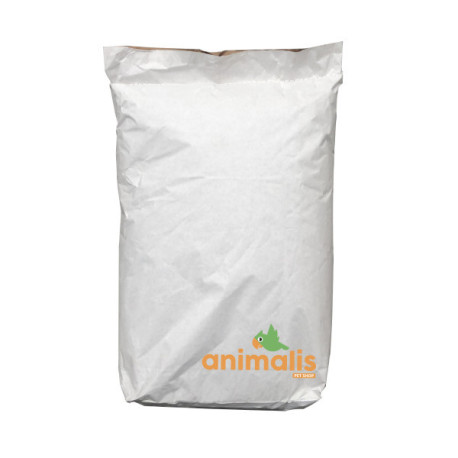- New
- In the process of being restocked








Reference: PANISROUGE-25KG
Striated sunflower is the basic seed of any parrot mixture. It is also used in mixtures for parakeets and exotic doves.
It is also the favorite food of your outdoor birds during the winter period! Ideal for feeding the birds in your garden.
Practical information for giving sunflower seeds to birds in your garden:
Remember to regularly clean the feeders of your outdoor birds so that diseases and bacteria do not thrive.
Also consider setting feeders high up to prevent predators (such as cats, foxes, etc.) from targeting birds when they are eating.
Pine seeds are a good source of Phosphorus, Magnesium, Zinc, Manganese, Copper, Iron, Vitamin E, K, B1, B2, B3, B9.
The green Pagima ensures the good health of your birds. Pagima green promotes the functioning of the intestines, thus ensuring better digestion. Pagima is also credited with a preventive action against inflammations of different types that threaten your birds, it is rich in vitamins and fiber, its smell is pleasant and its taste delicious.
Clover stimulates the immune system and slows down cellular ageing through its excellent antioxidant properties. Rich in vitamins B, C, E and provitamin A.
Aleppo pine seeds (medium) for parakeets, parrots, crossbills... is a natural seed of the pine cone, a delight for your birds, this seed also has therapeutic properties, it can be added to the seed mix or in a separate feeder.
They have the property of binding to minerals such as calcium, iron and zinc and making them less bioavailable.
Spinach seeds contain vitamins A, B1, B2, B3, B7, B9 and C, mineral salts and trace elements. Regular consumption helps to strengthen the feathers.
Millet contains magnesium, phosphorus, iron, potassium, manganese, vitamin A, vitamin B1, vitamin B2, vitamin PP (nicotinic acid) and vitamin B5.
Dimensions: 20kg
Perilla Blanc seeds contain about 25% fat, 65% of which is omega-3 alpha-linolenic acid, a polyunsaturated fatty acid (AGPI): good fat!
The wild rose is a wild rose bush whose rose hips are consumed in autumn and are very rich in vitamin C.
The flaxseed consists of 40 to 45% oil and 25% protein. Flaxseed preserves very well. It contains, in particular, two fatty acids with similar names (both derived from the word "lin"), linolenic acid (an omega-3) and linoleic acid.
The seed is used in animal feed, particularly for laying hens for which an increase in the omega-3 content of the eggs is desired.
Due to these properties, this seed aids digestion.

